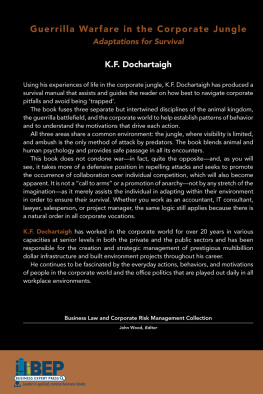
Guerrilla Warfare in the Corporate Jungle
Guerrilla Warfare in the Corporate Jungle
Adaptations for Survival
by
K.F. Dochartaigh

Guerrilla Warfare in the Corporate Jungle: Adaptations for Survival
Copyright Business Expert Press, LLC, 2021.
All rights reserved. No part of this publication may be reproduced, stored in a retrieval system, or transmitted in any form or by any meanselectronic, mechanical, photocopy, recording, or any other except for brief quotations, not to exceed 250 words, without the prior permission of the publisher.
First published in 2021 by
Business Expert Press, LLC
222 East 46th Street, New York, NY 10017
www.businessexpertpress.com
ISBN-13: 978-1-95253-884-1 (paperback)
ISBN-13: 978-1-95253-885-8 (e-book)
Business Expert Press Business Law and Corporate Risk Management Collection
Collection ISSN: 2333-6722 (print)
Collection ISSN: 2333-6730 (electronic)
Cover and interior design by S4Carlisle Publishing Services Private Ltd., Chennai, India
First edition: 2021
10 9 8 7 6 5 4 3 2 1
Printed in the United States of America.
For AvaAudentes Fortuna Iuvat
Description
This book is a survival manual for life in the corporate world which guides the reader on how best to navigate its pitfalls and avoid being trapped. It fuses three separate but intertwined disciplines of the Animal kingdom, The Guerrilla battlefield and the corporate world to help establish patterns of behaviour and understand the motivations that underpin each action.
All three areas share a common environment; the jungle, where visibility is limited and ambush is the only method of attack by predators. The book blends animal and human psychology and gives safe passage in all its encounters.
The book has been meticulously researched with animal behaviours documented and applied to the study of human psychology with additional research on Military techniques and combat psychology on ambush and counter insurgency also included in the attempt to understand and react to conflict in the workplace.
This book is designed to assist people at any stage in their career to better understand the motivations that underpin human interactions within the workplace. I have attempted to fuse three separate but closely related environments to highlight patterns and similarities that we can use to better ourselves in our daily interactions in our working lives.
As stated above; the corporate world, the animal kingdom and the battlefield all seem like an unlikely amalgamation but you will see that that all environments share common objectives, strategies and interdependencies that underpin everyday survival.
This book does not condone war, quite the opposite as you will see it takes more of a defensive position in repelling attacks and seeks to promote the occurrence of collaboration over individual competition which will also become apparent. It is not a call to arms or a promotion of anarchy, not by any stretch of the imagination, as it merely assists the individual in adapting within their environment in order to ensure their survival. Whether you work as an Accountant, IT consultant, Lawyer, Salesperson or Project Manager; the same logic still applies as there is a natural order in all corporate vocations. It matters not whether the majority of your business is carried out via teleconferences, Video conference or in person, the same logic will still apply. Face to face however will normally be the most impactful but you must learn to see the same politics played out through other mediums.
The books main message is that in order to be effective and survive in this world you will need to become an expert in three interrelated areas; You will need to know your environment , know your opponent an above all know yourself. Once you have mastered these three areas, you will enjoy the corporate world like never before.
Keywords
business psychology; stress management; conflict resolution; mediation; self-help; empowerment; self-realization; ego; leadership; mutualism; workplace conflict; interviews; classical game theory; evolutionary game theory; combat phycology; evolution; biology; statistical analysis; conflict studies; office politics; anthropomorphism; mimicry; aposematism; camouflage; project management; program management; skills development; careers management; performance review; leadership/management; hierarchy expectations; success criteria; written and oral communications; human behavior; drive; ambition; emotion; strategy
Contents
Non nobis solum nati sumus
(We are not born for ourselves alone.)
Cicero, Roman Statesman 106104 BC
The striking similarities between corporate workplaces and wild jungles cannot be denied.
Both environments typify intense competition, danger, fear, and, more importantly, cooperation.
We spend one-third of our 24-hour day at work, and 50% of our waking hours are dedicated to the office in pursuit of our economic means of survivalmoney.
In all tropical rain forests, competition underpins every interaction; from the trees competing for sunlight to the animals competing for food and territory, every day is a battle for survival.
The entire survival process, however, is underpinned by cooperation, which is often overlooked in the selfish pursuit of success, but in order to succeed in any of these environments, despite our best efforts, our success, like our fate, can often be beyond our control.
This is where we must learn to adapt our behaviors and actions and refine them to better increase our chances of survival when in any of these environments.
Lets look at how theories in relation to the elements of survival and competition have been presented throughout history.
In his most famous work Principles of Population, published in 1798, Economist Robert Malthus theorized that population growth in humans will always outstrip the level of necessary food required to feed each member of the population. This theory was influenced by current events surrounding the French Revolution (17891799) and is actually a sociopolitical commentary on that period, when the growth of the French population over time resulted in starvation and ultimately, unrest of the people. Malthus work essentially theorized that even if food were secured and distributed equally to all members of the population, it would still run out because demand would always outstrip supply in relation to these finite resources. He theorized that while populations increased geometrically, food supply increased only arithmetically.
For example, when humans breed, they essentially multiply, and each population increase is via progressive multiplication, whereas food production cannot keep up with this rapid progression and can increase only by addition. So if population grows by a factor of two, it looks something like this:
2, 4, 8, 16, 32, 64, 128,
whereas food production, in keeping up with the demand at a factor of two, can progress only like this:
2, 4, 6, 8, 10, 12, 14, 16
Malthus concluded that in situations where population outstrips food supply, individuals within the population will compete against each other for the same resources or cooperate to locate new food sources and sometimes undertake a mixture of both.
Charles Darwin grew very interested in this approach and applied this methodology to the study of animals, culminating in his most famous work
Next page










